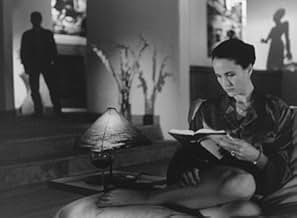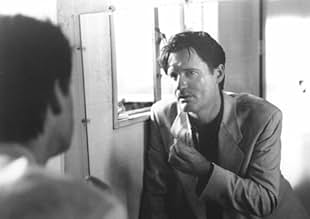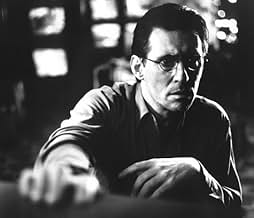IMDb-BEWERTUNG
5,6/10
5462
IHRE BEWERTUNG
Mike ist ein erfolgreicher Hollywood-Produzent von Gewaltfilmen. Dann erlebt er selbst extreme Gewalt, wird vermisst, schließt sich einigen Latino-Gärtnern an und lässt sein Leben Revue pass... Alles lesenMike ist ein erfolgreicher Hollywood-Produzent von Gewaltfilmen. Dann erlebt er selbst extreme Gewalt, wird vermisst, schließt sich einigen Latino-Gärtnern an und lässt sein Leben Revue passieren.Mike ist ein erfolgreicher Hollywood-Produzent von Gewaltfilmen. Dann erlebt er selbst extreme Gewalt, wird vermisst, schließt sich einigen Latino-Gärtnern an und lässt sein Leben Revue passieren.
- Auszeichnungen
- 1 Gewinn & 4 Nominierungen insgesamt
Nicole Ari Parker
- Ade Kenya
- (as Nicole Parker)
Samuel Fuller
- Louis Bering
- (as Sam Fuller)
Empfohlene Bewertungen
...or as I like to think of it, THE END OF VIOLENCE is the greatest scifi crime thriller that never was.
As always with Wim Wenders, the plot is fantastic. But, as always with Wim Wenders, the movie isn't about the plot, and those who expect to be carried by the plot will be disappointed. In the same way WINGS OF DESIRE had a great plot about angels but was not a fantasy; in the same way UNTIL THE END OF THE WORLD had a great plot about a high tech dream machine but was not about technology; in the same way LISBON STORY had a riveting plot about a missing person but was not a mystery, here we have the same Wendersian formula which he pulls off flawlessly.
The plot, if you're curious, is about a futuristic "God machine" that can eliminate people with the push of a button. Designed ostensibly for crime prevention & surveillance (the old "to protect & serve" - where have we heard that before?), it gets out of control and takes murder & corruption to the next level of clinical perfection. Caught up in the game is Mike Max, a movie producer struggling with his own intense xenophobia and paranoia, which, like a disease, he himself spreads to society through his films.
That's all I'll say about the plot because (a) I don't want to ruin anything, and (b) like I said, the plot is secondary. What's really important, as you watch this movie, is to pay attention to the thought-provoking dialogue, the philosophical allusions and the overall metaphor of the situation. If you can tune into that stuff, then you're set for a great experience.
I'll give you just one example of the philosophy. There's a scene early on where they talk about the "observer effect" (you might recognize it as the paradox of "Schrödinger's cat" which you can look up on wikipedia). This is the fundamental theme of the film: the idea that, even by "impartially observing", we change the situation or in some cases destroy it. As one of the characters says, it's like "flipping on the light to observe the darkness." What a poetic & appropriate analogy.
This movie is choc full of that kind of stuff, and you may miss it if you're expecting car chases and gunfire. No, instead you get the ultimate anti-violence violence film, and I gotta give Wenders a standing ovation on being the first director I've seen pull it off.
A lot of movies in the past have carried a message of anti-violence; yet the films sink to the thrill of showing violence themselves and often glorifying it (the biggest example would be Norm Jewison's classic ROLLERBALL), and this becomes confusing if not outright hypocritical. But in this case, we get a chilling depiction of the epidemic of violence without showing any blood & guts to excite our savage instincts. It remains an intellectual film, not visceral. Don't get me wrong; this movie is plenty suspenseful, and on more than one occasion it'll have your heart flopping like an electrified noodle. But it's all done by way of the mind. To me, that's what makes this depiction of violence all the more effective & frightening: the way it's so clean & neat like in a video game. And without any fuss, someone's head could just go pop.
This is the best film I've seen in a while. I'm only taking off a few points because I wished it was twice as long & had more monologues, like some of the older Wenders films. But I have to say this film sticks to its objective and delivers a perfect product.
As always with Wim Wenders, the plot is fantastic. But, as always with Wim Wenders, the movie isn't about the plot, and those who expect to be carried by the plot will be disappointed. In the same way WINGS OF DESIRE had a great plot about angels but was not a fantasy; in the same way UNTIL THE END OF THE WORLD had a great plot about a high tech dream machine but was not about technology; in the same way LISBON STORY had a riveting plot about a missing person but was not a mystery, here we have the same Wendersian formula which he pulls off flawlessly.
The plot, if you're curious, is about a futuristic "God machine" that can eliminate people with the push of a button. Designed ostensibly for crime prevention & surveillance (the old "to protect & serve" - where have we heard that before?), it gets out of control and takes murder & corruption to the next level of clinical perfection. Caught up in the game is Mike Max, a movie producer struggling with his own intense xenophobia and paranoia, which, like a disease, he himself spreads to society through his films.
That's all I'll say about the plot because (a) I don't want to ruin anything, and (b) like I said, the plot is secondary. What's really important, as you watch this movie, is to pay attention to the thought-provoking dialogue, the philosophical allusions and the overall metaphor of the situation. If you can tune into that stuff, then you're set for a great experience.
I'll give you just one example of the philosophy. There's a scene early on where they talk about the "observer effect" (you might recognize it as the paradox of "Schrödinger's cat" which you can look up on wikipedia). This is the fundamental theme of the film: the idea that, even by "impartially observing", we change the situation or in some cases destroy it. As one of the characters says, it's like "flipping on the light to observe the darkness." What a poetic & appropriate analogy.
This movie is choc full of that kind of stuff, and you may miss it if you're expecting car chases and gunfire. No, instead you get the ultimate anti-violence violence film, and I gotta give Wenders a standing ovation on being the first director I've seen pull it off.
A lot of movies in the past have carried a message of anti-violence; yet the films sink to the thrill of showing violence themselves and often glorifying it (the biggest example would be Norm Jewison's classic ROLLERBALL), and this becomes confusing if not outright hypocritical. But in this case, we get a chilling depiction of the epidemic of violence without showing any blood & guts to excite our savage instincts. It remains an intellectual film, not visceral. Don't get me wrong; this movie is plenty suspenseful, and on more than one occasion it'll have your heart flopping like an electrified noodle. But it's all done by way of the mind. To me, that's what makes this depiction of violence all the more effective & frightening: the way it's so clean & neat like in a video game. And without any fuss, someone's head could just go pop.
This is the best film I've seen in a while. I'm only taking off a few points because I wished it was twice as long & had more monologues, like some of the older Wenders films. But I have to say this film sticks to its objective and delivers a perfect product.
I'm not surprised that a child would not understand this movie. To me it was very meaningful, but only in terms of lived experience in jobs and politics. It's really "Brave New World," where authority figures keep order by putting up cameras everywhere and intervening to eliminate anyone who is disorderly or criminal. Violence is a huge preoccupation, but only tolerated as make-believe -- but the make-believe gets confused with real violence. Control, transgression, power are the pivots of the well-to-do. Ashcroft stuff.
But the Mexican and immigrant families offer a warmer, truer alternative. In the end, they are more powerful because they are free and can think. The Kinko's episode, in which the police are defeated from taking control by their own preconceptions, is a good example. As underlings, laborers, the Mexicans understand what's at stake and they are everywhere, invisible to their employers.
The intellectual technician doesn't catch on until it's too late.
I'm told that what I saw was a re-cut and that the early version was indeed chaotic with a lot of loose ends. All I can say is that now this is one of the videos I rewatch and ponder.
But the Mexican and immigrant families offer a warmer, truer alternative. In the end, they are more powerful because they are free and can think. The Kinko's episode, in which the police are defeated from taking control by their own preconceptions, is a good example. As underlings, laborers, the Mexicans understand what's at stake and they are everywhere, invisible to their employers.
The intellectual technician doesn't catch on until it's too late.
I'm told that what I saw was a re-cut and that the early version was indeed chaotic with a lot of loose ends. All I can say is that now this is one of the videos I rewatch and ponder.
How 'bout a four? Visually, there are some great moments. I think the most interesting scenes are those where there is no dialogue but the camera follows the characters as they inwardly contemplate what this all means (Bill Pullman, Andie McDowell). Unfortunately, we as the viewers are also given (too much) time to contemplate what it means. Everything is WAY too understated. The movie slows to a stop in many places. You start to like it (the romance with Kat and the investigator, the interaction of Bill Pullman's character and the Mexican-American people) and then it doesn't follow through. The dialogue at the film school, in which the characters give a monologue for a class is probably the most interesting dialogue. Some rap, some tell a story, some recite their own poetry. That was the most moving part of the movie. While Wenders has a important point to make, it doesn't come through clearly and the viewer is left uncaring, uninterested. Maybe the only thing that could have helped the End of Violence is more good ole fashioned...violence <g>.
I don't think I've ever seen a movie that is so cerebral yet so poor at the same time. Wim Wenders is certainly revered in the film community for his offbeat ethereal productions (i.e. Wings of Desire), however, nothing profound or comprehensible can be extracted from his latest effort. It is as if four or five scripts were dropped in a studio parking lot by some clumsy intern and what was left was thrown together so that somebody wouldn't get fired. There are some common links between the characters but what does any of it have to do with the underlying plot of satellite surveillance? I kept waiting for the film to decide which plot it thought was most interesting, but it remained undecided to the very end. This was a frustrating experience to say the least.
The most aggravating aspect of this film is the fact that none of the parties involved appear to incompetent, so how is this movie so bad? Maybe I missed something...
The one saving grace of this film is the performance of Udo Kier as a German director. He alone mutters the one or two lines that managed to get me to crack a smile during this disaster.
The most aggravating aspect of this film is the fact that none of the parties involved appear to incompetent, so how is this movie so bad? Maybe I missed something...
The one saving grace of this film is the performance of Udo Kier as a German director. He alone mutters the one or two lines that managed to get me to crack a smile during this disaster.
I watched this movie a few times, and I have met very few people who liked it as much as I did. I see it as an artful expression of all the critical thoughts in philosophy, sociology etc. that show how genocide, ultra-violence and fascist methods of population-control can develop out of all the promises of order, justice and peace the the modern state makes to its citizens. Also, the dialogue has absolutely superb moments, as when Mike the fugitive of the state says to his wife confronts his ex-wife with the words "Who can I turn myself into? Well I see who you turned yourself into...". A lot of people seem to dislike the loose ends and unexplained shifts that the characters make - but I say, in that very absence of rigid structure the film makes a parallel to the manifest ambivalence of modern life as a citizen: Our greatest protector is also our greatest threat.
Wusstest du schon
- WissenswertesThere is a scene in the film where we see a live recreation of the painting "Nighthawks" by Edward Hopper.
- PatzerWhen Page is holding Mike at gunpoint she holds the gun upward with the bottom of the handle facing outward and the ammo clip is clearly missing. Yet when Mike exits through the patio door she fires the gun and shatters the glass.
Obviously there was a bullet in the chamber.
- SoundtracksBailare (El Merecumbe)
Written, Performed and Produced by Raul Malo
Courtesy of MCA Records, by arrangement with Universal Music
Special Markets
Top-Auswahl
Melde dich zum Bewerten an und greife auf die Watchlist für personalisierte Empfehlungen zu.
- How long is The End of Violence?Powered by Alexa
Details
- Erscheinungsdatum
- Herkunftsländer
- Sprachen
- Auch bekannt als
- The End of Violence
- Drehorte
- Griffith Observatory, 2800 E Observatory Rd, Los Angeles, Kalifornien, USA(Multiple interior and exterior scenes; as Ray Bering's workshop. Hillside hike viewpoint just south of observarory)
- Produktionsfirmen
- Weitere beteiligte Unternehmen bei IMDbPro anzeigen
Box Office
- Budget
- 5.000.000 $ (geschätzt)
- Bruttoertrag in den USA und Kanada
- 386.673 $
- Weltweiter Bruttoertrag
- 386.673 $
- Laufzeit
- 2 Std. 2 Min.(122 min)
- Farbe
- Sound-Mix
- Seitenverhältnis
- 2.35 : 1
Zu dieser Seite beitragen
Bearbeitung vorschlagen oder fehlenden Inhalt hinzufügen

























